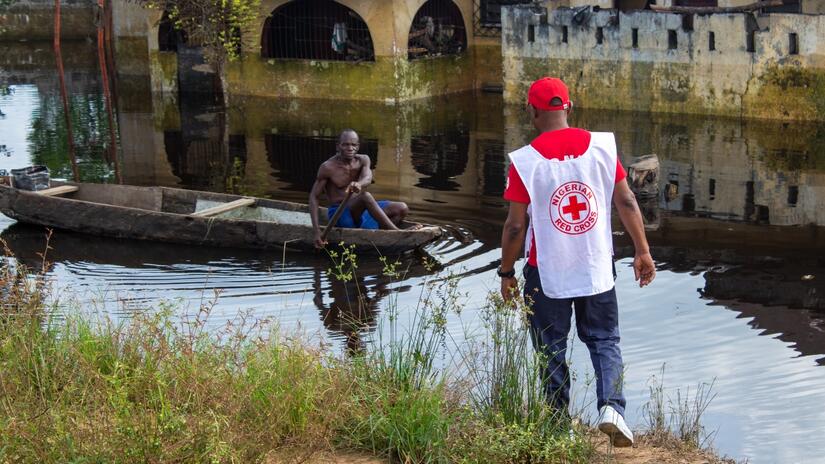Over the past 20 years, the number of climate-related events and people affected in Africa has risen dramatically. Successive devastating crises, such as droughts in the Horn of Africa and deadly cyclones and floods in Mozambique and Libya, will likely continue as the frequency and impact of climate extremes continue to intensify. Africa´s population is also projected to double in the next 30 years, meaning more will be impacted in the coming years if nothing is done.
We cannot allow lives to be lost in predictable disasters. Early warning systems with early action are the most effective and dignified way to prevent an extreme weather event from causing a humanitarian crisis—especially for the most vulnerable and remote communities.
Two weeks ago, the Africa Climate Summit 2023 (ACS23) and the Africa Climate Week 2023 were convened in Nairobi. Leaders from governments, businesses, international organizations, and civil society gathered to explore ways to reduce greenhouse gas emissions while adapting to the mounting fallout from the climate crisis.
Shortly after, the IFRC hosted the 10th Pan African Conference (PAC) bringing together Red Cross and Red Crescent leadership from 54 countries to discuss renewing investment in the continent.
The ACS23 had only just concluded when the continent was struck by two major disasters: a massive earthquake in Morocco and Storm Daniel in Libya, both claiming thousands of lives and wiping out years of development.
Rapid analysis of Storm Daniel has shown climate change made the catastrophe ‘far more likely’. And while earthquakes are not climate-related, the impact of the Morocco earthquake will linger for years, making affected communities more vulnerable to climate-related risks and hazards.
The IFRC network quickly mobilized resources and emergency teams in both countries to support affected people and get urgently needed humanitarian assistance to hard-to-reach areas. But both disasters point to the need to invest in multi-hazard and people-centered risk reduction, adaptation and resilience in communities before disasters strike—a resounding call at the ACS23 and PAC.
Africa has a strong network of 54 Red Cross and Red Crescent Societies, the majority of which have signed our Climate and Environment Charter for Humanitarian Organizations which aims to galvanize a collective humanitarian response to the climate and environmental crisis. However, we need to do more to leverage our combined strengths, expertise, and resources to address the complex and diverse humanitarian challenges the continent is facing.
While there are success stories to celebrate, fundamentals of National Society Development (NSD), along with risk management, localization, digital transformation, and improved membership coordination remain central to the ambition of African National Societies to deliver the most effective humanitarian, public health, and development services to their communities.
These challenges and achievements were reviewed at the 10th PAC, with reflections and lessons turned into a reference framework for new actions and targets for African National Societies over the next four years.
At the ACS23, an initiative politically endorsed at COP was launched for the continent: the Early Warnings for All Africa Action Plan. The IFRC, with its long and in-depth experience in disaster management, will lead the preparedness and response pillar of the plan and support the dissemination and communication pillar. The latter involves leveraging digital technology, such as mobile networks, apps, and social media platforms, to reach a wider audience and ensure the delivery of warnings in a timely manner.
A huge step in the right direction, the ACS23 also provided space for:
- African leaders to boldly speak on their climate ambitions, calling for urgent action and showcasing the proactive approach taken by African countries to address the impacts of the changing climate on the most vulnerable. This was clearly summarized in the Nairobi Declaration on Climate Change.
- Youth and children to reflect on their power as young people to drive meaningful climate action and change in their society.
- Discussion on ways to boost investments in interventions around women’s empowerment, green growth, and climate action.
- A call by African leaders for accountability to countries responsible for the highest emissions to honour their commitments to operationalize the loss and damage fund, including the pressure for a shift in the global financing architecture.
As we gear up to COP 28 in Dubai, it will be crucial for the African continent to have a joint and common position on key issues related to the climate crisis, especially on prioritizing the most vulnerable communities, unlocking more and flexible financing for adaptation, and calling for further, urgent action around loss and damage commitments made at COP 27.
We need to continue dialogue with the most at-risk and vulnerable communities to address the gaps in the Nairobi declaration as we work to mobilize local resources for innovative and tangible solutions to the climate crisis.






